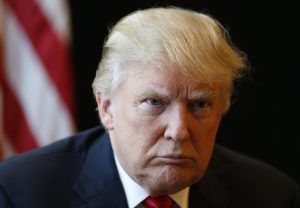
In a summer of political and racial tumult, young Americans are in a dour mood: pessimistic about the fairness of their economic system, questioning the greatness of the United States and deeply skeptical of the way the nation picks its leaders.
A new poll of young people between the ages of 18 and 30 finds that an overwhelming 90 percent think the two-party political system has real — though fixable — problems or that it is “seriously broken.” Three-quarters believe the U.S. is “falling behind” or “failing” as a nation.
Just over half say the chance to get ahead economically is reserved for only a few people at the top.
Though the new GenForward survey is a poll of all young people, not necessarily registered or likely voters, it nevertheless shows clear discontent with the two major-party candidates for president. Only 39 percent of young people have a favorable opinion of Hillary Clinton. Just 19 percent think well of Donald Trump.
The generation that is the most educated, diverse and indebted in U.S. history is still pining for the candidate who only this week left the race: Vermont Sen. Bernie Sanders.
“Millennials, unfortunately, are subject to an economic and political future that is not of their own making,” said Sarah Swanbeck, executive director of the Center on Governing & Investing in the Future at the Goldman School of Public Policy at the University of California, Berkeley. “It’s no surprise then that young adults across the country have increasingly turned to ‘political outsiders’ promising to reform the system.”
GenForward is a survey by the Black Youth Project at the University of Chicago with the Associated Press-NORC Center for Public Affairs Research. The first-of-its-kind poll pays special attention to the voices of young adults of color, highlighting how race and ethnicity shape the opinions of a new generation.
There’s a strong desire among young people of all races and ethnicities for a third-party challenger to Trump and Clinton: 72 percent of Latinos and whites, 67 percent of Asian-Americans and 63 percent of African-Americans.
“The candidates we’re left with are very similar,” said Alejandro Ochoa, a 21-year-old from Adelanto, California. “I say that they’re similar mainly because they’re both rich, and I get the sense that they’re going to look out more for the 1 percent and not the rest of us.”
Only 5 percent of respondents said the United States is greater than ever, with an additional 14 percent saying it’s as great as it has been in the past. More than half said the country is “falling behind” and a quarter said it’s “failing.”
Young whites expressed the greatest dismay, with 84 percent saying the country is falling behind or failing. About two-thirds of young Latinos, Asian-Americans and African-Americans thought so.
Lakevia Davis, a 24-year-old college student in Montgomery, Alabama, is among the 23 percent of African-Americans who say the country is failing. Davis worries that her older brother or father could be shot and killed by police. She wonders if the U.S. will ever have a president who can address what she sees as inequities and fear seared into the country.
“I just feel like a lot of the times we’re forced to pick the lesser of two evils rather than the right candidate,” said Davis, who supported Sanders.
A quarter of young people overall say the distribution of wealth and money is fair, but while 32 percent of whites said so, only 12 percent of African-Americans agreed. About 20 percent of Asian-Americans and Latinos said distribution is fair.
Overall, 54 percent said that only a few people at the top have a chance to get ahead, while the remainder said that anyone can rise economically. Those figures were consistent for all races and ethnicities.
Matthew Monnot, an assistant professor at the University of San Francisco School of Management, said wages haven’t grown for decades and have, in fact, decreased for lower-paid professions while increasing dramatically for those at the top.
“It’s been completely stagnant,” Monnot said, “so for the people you’re surveying, their entire life span has been that of the average worker not having any wage increase.”
Young adults are especially sour about the two-party political system. More than a third of respondents said the system is seriously broken, with just 9 percent saying it is working well. The majority, 54 percent, said the system has real problems but can be fixed.
Natalie Woodford, a white 25-year-old doctoral candidate in nutrition and exercise at Virginia Tech, counts herself in that group. She imagines a country that isn’t so consumption-oriented, a place where people don’t have to pay more to eat healthfully and don’t feel that a fat salary equals success.
“There’s bound to be people out there who are having similar thoughts and at the end of the day want to do what’s right,” she said.
___
The poll of 1,965 adults 18-30 was conducted June 14-27 using a sample drawn from the probability-based GenForward panel, which is designed to be representative of the U.S. young adult population. The margin of sampling error for all respondents is plus or minus 3.8 percentage points.
The survey was paid for by the Black Youth Project at the University of Chicago using grants from the John D. and Catherine T. MacArthur Foundation and the Ford Foundation.




